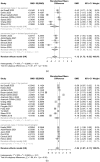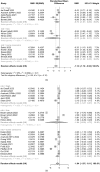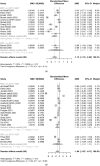Brief CBT-based psychological interventions to improve mental health outcomes in refugee populations: a systematic review and meta-analysis
- PMID: 39212049
- PMCID: PMC11370682
- DOI: 10.1080/20008066.2024.2389702
Brief CBT-based psychological interventions to improve mental health outcomes in refugee populations: a systematic review and meta-analysis
Abstract
Background: Refugees, asylum seekers, and internally displaced people experience a high burden of mental health problems owing to their experiencing traumas and stressful events.Objective: To summarise the available evidence and analyse the efficacy of brief psychological interventions (< 3 months) on improving mental health outcomes, including depression, anxiety, and post-traumatic stress disorder (PTSD)-related symptoms in refugees.Method: We searched Medline, EMBASE, PsycINFO, CINAHL, and Global Index Medicus from inception to 19 December 2023. We included controlled studies using any cognitive behavioural therapy (CBT) or CBT-based therapies delivered over a short time (< 3 months), which reported mental health outcomes pre-and post-intervention. We conducted meta-analyses using random effects to derive pooled summary statistics. The quality of the evidence was assessed with the Cochrane Risk of Bias (RoB2) and ROBINS-I tools. This study is registered on the Open Science Framework, DOI 10.17605/OSF.IO/9CXU4.Results: 34 eligible studies across 37 publications were retrieved for analysis, and 33 studies with 4479 participants were included in the meta-analysis. There was an overall improvement in immediate mental health outcomes for all three domains, with analysis of 13 studies on anxiety outcomes (SMD -1.12, 95% CI -1.72 to -0.52), 20 studies on depression (SMD -1.04, 95% CI -1.97 to -0.11), and 24 studies on PTSD (SMD -0.82, 95% CI -1.20 to -0.45). At 3 to 6-month follow-up, however, analysis of mental health outcomes shows no significant change from baseline, with a SMD of 0.24 (95% CI -0.94 to 1.42) across 4 studies, -0.73 (95% CI -2.14 to 0.68) across 9 studies, and 0.29 (95% CI -0.94 to 1.53) across 12 studies for anxiety, depression, and PTSD respectively.Conclusion: Low-quality evidence shows brief psychological interventions have a positive immediate effect on refugees and internally displaced people's mental well-being. However, these effects do not persist in the short-term follow up. Heterogeneity was high, even among subgroups, impacting our findings' generalisability.
Antecedentes: Los refugiados, los solicitantes de asilo y las personas desplazadas internamente experimentan una gran carga de problemas de salud mental debido a la experiencia de traumas y eventos estresantes.
Objetivo: Resumir la evidencia disponible y analizar la eficacia de las intervenciones psicológicas breves (<3 meses) para mejorar los resultados de salud mental, incluidos los síntomas relacionados con la depresión, ansiedad y trastorno de estrés postraumático (TEPT) en refugiados.
Método: Realizamos búsquedas en Medline, EMBASE, PsycINFO, CINAHL y Global Index Medicus desde el inicio hasta el 19 de diciembre de 2023. Incluimos estudios controlados que utilizaban cualquier terapia cognitivo-conductual (TCC) o terapias basadas en TCC administradas durante un período corto (<3 meses), que informaban resultados de salud mental pre y post-intervención. Realizamos metanálisis utilizando efectos aleatorios para derivar estadísticas de resumen agrupadas. La calidad de la evidencia se evaluó con las herramientas Cochrane Risk of Bias (RoB2) y ROBINS-I. Este estudio está registrado en Open Science Framework, DOI
Resultados: Se recuperaron 34 estudios elegibles para el análisis en 37 publicaciones, y se incluyeron 33 estudios con 4.479 participantes en el metanálisis. Hubo una mejoría general en los resultados inmediatos de salud mental para los tres dominios, con análisis de 13 estudios sobre resultados de ansiedad (SMD −1,12, IC del 95%: −1,72 a −0,52), 20 estudios sobre depresión (SMD −1,04, IC del 95%: −1,97 a −0,11) y 24 estudios sobre TEPT (SMD −0,82, IC del 95%: −1,20 a −0,45). Sin embargo, en el seguimiento de 3 a 6 meses, el análisis de los resultados de salud mental no muestra cambios significativos desde el basal, con una SMD de 0,24 (IC del 95%: −0,94 a 1,42) en 4 estudios, −0,73 (IC del 95%: −2,14 a 0,68) en 9 estudios y 0,29 (IC del 95%: −0,94 a 1,53) en 12 estudios para ansiedad, depresión y TEPT respectivamente.
Conclusión: La evidencia de baja calidad muestra que las intervenciones psicológicas breves tienen un efecto inmediato positivo en el bienestar mental de los refugiados y las personas desplazadas internamente. Sin embargo, estos efectos no persisten en el seguimiento a corto plazo. La heterogeneidad fue alta, incluso entre los subgrupos, lo que afecta la generalización de nuestros hallazgos.
Keywords: CBT; PTSD; Refugees; Refugiados; TCC; TEPT; ansiedad; anxiety; asylum seekers; brief psychological intervention; depresión; depression; internally displaced persons; intervención psicológica breve; meta-analysis; metaanálisis; personas desplazadas internamente; revisión sistemática; solicitantes de asilo; systematic review.
Plain language summary
We analysed the evidence on the use of brief CBT-based psychological interventions to improve mental health outcomes in forcibly displaced persons.These interventions had a positive effect on anxiety, depression and PTSD, though there was high heterogeneity between studies.Positive effects on mental health disappeared at long-term follow-up.
Conflict of interest statement
No potential conflict of interest was reported by the author(s).
Figures












Similar articles
-
Psychological therapies for women who experience intimate partner violence.Cochrane Database Syst Rev. 2020 Jul 1;7(7):CD013017. doi: 10.1002/14651858.CD013017.pub2. Cochrane Database Syst Rev. 2020. PMID: 32608505 Free PMC article.
-
Psychological therapies for post-traumatic stress disorder and comorbid substance use disorder.Cochrane Database Syst Rev. 2016 Apr 4;4(4):CD010204. doi: 10.1002/14651858.CD010204.pub2. Cochrane Database Syst Rev. 2016. PMID: 27040448 Free PMC article.
-
Psychological and pharmacological interventions for posttraumatic stress disorder and comorbid mental health problems following complex traumatic events: Systematic review and component network meta-analysis.PLoS Med. 2020 Aug 19;17(8):e1003262. doi: 10.1371/journal.pmed.1003262. eCollection 2020 Aug. PLoS Med. 2020. PMID: 32813696 Free PMC article.
-
Psychological therapies for the treatment of mental disorders in low- and middle-income countries affected by humanitarian crises.Cochrane Database Syst Rev. 2018 Jul 5;7(7):CD011849. doi: 10.1002/14651858.CD011849.pub2. Cochrane Database Syst Rev. 2018. PMID: 29975811 Free PMC article.
-
Therapist-supported Internet cognitive behavioural therapy for anxiety disorders in adults.Cochrane Database Syst Rev. 2016 Mar 12;3(3):CD011565. doi: 10.1002/14651858.CD011565.pub2. Cochrane Database Syst Rev. 2016. PMID: 26968204 Free PMC article.
Cited by
-
Comparative efficacy and acceptability of psychosocial interventions for PTSD, depression, and anxiety in asylum seekers, refugees, and other migrant populations: a systematic review and network meta-analysis of randomised controlled studies.Lancet Reg Health Eur. 2024 Nov 29;48:101152. doi: 10.1016/j.lanepe.2024.101152. eCollection 2025 Jan. Lancet Reg Health Eur. 2024. PMID: 39687671 Free PMC article.
-
The impact of trauma and how to intervene: a narrative review of psychotraumatology over the past 15 years.Eur J Psychotraumatol. 2025 Dec;16(1):2458406. doi: 10.1080/20008066.2025.2458406. Epub 2025 Feb 6. Eur J Psychotraumatol. 2025. PMID: 39912534 Free PMC article. Review.
References
-
- Abtahi, Z., Potocky, M., Eizadyar, Z., Burke, S. L., & Fava, N. M. (2023). Digital interventions for the mental health and well-being of international migrants: A systematic review. Research on Social Work Practice, 33(5), 518–529. 10.1177/10497315221118854 - DOI
-
- Acarturk, C., Uygun, E., Ilkkursun, Z., Yurtbakan, T., Kurt, G., Adam-Troian, J., Senay, I., Bryant, R., Cuijpers, P., Kiselev, N., McDaid, D., Morina, N., Nisanci, Z., Park, A. L., Sijbrandij, M., Ventevogel, P., & Fuhr, D. C. (2022). Group problem management plus (PM+) to decrease psychological distress among Syrian refugees in Turkey: A pilot randomised controlled trial. BMC Psychiatry, 22(1), 8. 10.1186/s12888-021-03645-w - DOI - PMC - PubMed
-
- Adenauer, H., Catani, C., Gola, H., Keil, J., Ruf, M., Schauer, M., & Neuner, F. (2011). Narrative exposure therapy for PTSD increases top-down processing of aversive stimuli—Evidence from a randomized controlled treatment trial. BMC Neuroscience, 12, 127. 10.1186/1471-2202-12-127 - DOI - PMC - PubMed
-
- Aizik-Reebs, A., Yuval, K., Hadash, Y., Gebreyohans Gebremariam, S., & Bernstein, A. (2021). Mindfulness-based trauma recovery for refugees (MBTR-R): Randomized waitlist-control evidence of efficacy and safety. Clinical Psychological Science, 9(6), 1164–1184. 10.1177/2167702621998641 - DOI
-
- Alsheikh, Ali, S A. S.. (2020). Efficiency of intervention counseling program on the enhanced psychological well-being and reduced post-traumatic stress disorder symptoms among Syrian women refugee survivors . Clinical Practice and Epidemiology in Mental Health : CP & EMH, 16(Suppl-1), 134–141. 10.2174/1745017902016010134 - DOI - PMC - PubMed
Publication types
MeSH terms
LinkOut - more resources
Full Text Sources
Other Literature Sources
Medical
